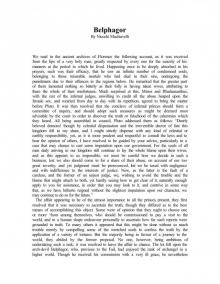- Home
- Niccolo Machiavelli
Valentino Page 10
Valentino Read online
Page 10
that hatred which the people might have conceived against him for his
violence.
But his son Antoninus was a most eminent man, and had very excellent
qualities, which made him admirable in the sight of the people and
acceptable to the soldiers, for he was a warlike man, most enduring of
fatigue, a despiser of all delicate food and other luxuries, which
caused him to be beloved by the armies. Nevertheless, his ferocity and
cruelties were so great and so unheard of that, after endless single
murders, he killed a large number of the people of Rome and all those
of Alexandria. He became hated by the whole world, and also feared by
those he had around him, to such an extent that he was murdered in the
midst of his army by a centurion. And here it must be noted that such-
like deaths, which are deliberately inflicted with a resolved and
desperate courage, cannot be avoided by princes, because any one who
does not fear to die can inflict them; but a prince may fear them the
less because they are very rare; he has only to be careful not to do
any grave injury to those whom he employs or has around him in the
service of the state. Antoninus had not taken this care, but had
contumeliously killed a brother of that centurion, whom also he daily
threatened, yet retained in his bodyguard; which, as it turned out,
was a rash thing to do, and proved the emperor's ruin.
But let us come to Commodus, to whom it should have been very easy to
hold the empire, for, being the son of Marcus, he had inherited it,
and he had only to follow in the footsteps of his father to please his
people and soldiers; but, being by nature cruel and brutal, he gave
himself up to amusing the soldiers and corrupting them, so that he
might indulge his rapacity upon the people; on the other hand, not
maintaining his dignity, often descending to the theatre to compete
with gladiators, and doing other vile things, little worthy of the
imperial majesty, he fell into contempt with the soldiers, and being
hated by one party and despised by the other, he was conspired against
and was killed.
It remains to discuss the character of Maximinus. He was a very
warlike man, and the armies, being disgusted with the effeminacy of
Alexander, of whom I have already spoken, killed him and elected
Maximinus to the throne. This he did not possess for long, for two
things made him hated and despised; the one, his having kept sheep in
Thrace, which brought him into contempt (it being well known to all,
and considered a great indignity by every one), and the other, his
having at the accession to his dominions deferred going to Rome and
taking possession of the imperial seat; he had also gained a
reputation for the utmost ferocity by having, through his prefects in
Rome and elsewhere in the empire, practised many cruelties, so that
the whole world was moved to anger at the meanness of his birth and to
fear at his barbarity. First Africa rebelled, then the Senate with all
the people of Rome, and all Italy conspired against him, to which may
be added his own army; this latter, besieging Aquileia and meeting
with difficulties in taking it, were disgusted with his cruelties, and
fearing him less when they found so many against him, murdered him.
I do not wish to discuss Heliogabalus, Macrinus, or Julian, who, being
thoroughly contemptible, were quickly wiped out; but I will bring this
discourse to a conclusion by saying that princes in our times have
this difficulty of giving inordinate satisfaction to their soldiers in
a far less degree, because, notwithstanding one has to give them some
indulgence, that is soon done; none of these princes have armies that
are veterans in the governance and administration of provinces, as
were the armies of the Roman Empire; and whereas it was then more
necessary to give satisfaction to the soldiers than to the people, it
is now more necessary to all princes, except the Turk and the Soldan,
to satisfy the people rather the soldiers, because the people are the
more powerful.
From the above I have excepted the Turk, who always keeps round him
twelve thousand infantry and fifteen thousand cavalry on which depend
the security and strength of the kingdom, and it is necessary that,
putting aside every consideration for the people, he should keep them
his friends. The kingdom of the Soldan is similar; being entirely in
the hands of soldiers, it follows again that, without regard to the
people, he must keep them his friends. But you must note that the
state of the Soldan is unlike all other principalities, for the reason
that it is like the Christian pontificate, which cannot be called
either an hereditary or a newly formed principality; because the sons
of the old prince are not the heirs, but he who is elected to that
position by those who have authority, and the sons remain only
noblemen. And this being an ancient custom, it cannot be called a new
principality, because there are none of those difficulties in it that
are met with in new ones; for although the prince is new, the
constitution of the state is old, and it is framed so as to receive
him as if he were its hereditary lord.
But returning to the subject of our discourse, I say that whoever will
consider it will acknowledge that either hatred or contempt has been
fatal to the above-named emperors, and it will be recognized also how
it happened that, a number of them acting in one way and a number in
another, only one in each way came to a happy end and the rest to
unhappy ones. Because it would have been useless and dangerous for
Pertinax and Alexander, being new princes, to imitate Marcus, who was
heir to the principality; and likewise it would have been utterly
destructive to Caracalla, Commodus, and Maximinus to have imitated
Severus, they not having sufficient valour to enable them to tread in
his footsteps. Therefore a prince, new to the principality, cannot
imitate the actions of Marcus, nor, again, is it necessary to follow
those of Severus, but he ought to take from Severus those parts which
are necessary to found his state, and from Marcus those which are
proper and glorious to keep a state that may already be stable and
firm.
CHAPTER XX
ARE FORTRESSES, AND MANY OTHER THINGS TO WHICH PRINCES
OFTEN RESORT, ADVANTAGEOUS OR HURTFUL?
1. Some princes, so as to hold securely the state, have disarmed
their subjects; others have kept their subject towns distracted by
factions; others have fostered enmities against themselves; others
have laid themselves out to gain over those whom they distrusted in
the beginning of their governments; some have built fortresses; some
have overthrown and destroyed them. And although one cannot give a
final judgment on all of these things unless one possesses the
particulars of those states in which a decision has to be made,
nevertheless I will speak as comprehensively as the matter of itself
will admit.
2. There never was a new prince who has disarmed his subjects; rather
&n
bsp; when he has found them disarmed he has always armed them, because, by
arming them, those arms become yours, those men who were distrusted
become faithful, and those who were faithful are kept so, and your
subjects become your adherents. And whereas all subjects cannot be
armed, yet when those whom you do arm are benefited, the others can be
handled more freely, and this difference in their treatment, which
they quite understand, makes the former your dependents, and the
latter, considering it to be necessary that those who have the most
danger and service should have the most reward, excuse you. But when
you disarm them, you at once offend them by showing that you distrust
them, either for cowardice or for want of loyalty, and either of these
opinions breeds hatred against you. And because you cannot remain
unarmed, it follows that you turn to mercenaries, which are of the
character already shown; even if they should be good they would not be
sufficient to defend you against powerful enemies and distrusted
subjects. Therefore, as I have said, a new prince in a new
principality has always distributed arms. Histories are full of
examples. But when a prince acquires a new state, which he adds as a
province to his old one, then it is necessary to disarm the men of
that state, except those who have been his adherents in acquiring it;
and these again, with time and opportunity, should be rendered soft
and effeminate; and matters should be managed in such a way that all
the armed men in the state shall be your own soldiers who in your old
state were living near you.
3. Our forefathers, and those who were reckoned wise, were accustomed
to say that it was necessary to hold Pistoia by factions and Pisa by
fortresses; and with this idea they fostered quarrels in some of their
tributary towns so as to keep possession of them the more easily. This
may have been well enough in those times when Italy was in a way
balanced, but I do not believe that it can be accepted as a precept
for to-day, because I do not believe that factions can ever be of use;
rather it is certain that when the enemy comes upon you in divided
cities you are quickly lost, because the weakest party will always
assist the outside forces and the other will not be able to resist.
The Venetians, moved, as I believe, by the above reasons, fostered the
Guelph and Ghibelline factions in their tributary cities; and although
they never allowed them to come to bloodshed, yet they nursed these
disputes amongst them, so that the citizens, distracted by their
differences, should not unite against them. Which, as we saw, did not
afterwards turn out as expected, because, after the rout at Vaila, one
party at once took courage and seized the state. Such methods argue,
therefore, weakness in the prince, because these factions will never
be permitted in a vigorous principality; such methods for enabling one
the more easily to manage subjects are only useful in times of peace,
but if war comes this policy proves fallacious.
4. Without doubt princes become great when they overcome the
difficulties and obstacles by which they are confronted, and therefore
fortune, especially when she desires to make a new prince great, who
has a greater necessity to earn renown than an hereditary one, causes
enemies to arise and form designs against him, in order that he may
have the opportunity of overcoming them, and by them to mount higher,
as by a ladder which his enemies have raised. For this reason many
consider that a wise prince, when he has the opportunity, ought with
craft to foster some animosity against himself, so that, having
crushed it, his renown may rise higher.
5. Princes, especially new ones, have found more fidelity and
assistance in those men who in the beginning of their rule were
distrusted than among those who in the beginning were trusted.
Pandolfo Petrucci, Prince of Siena, ruled his state more by those who
had been distrusted than by others. But on this question one cannot
speak generally, for it varies so much with the individual; I will
only say this, that those men who at the commencement of a princedom
have been hostile, if they are of a description to need assistance to
support themselves, can always be gained over with the greatest ease,
and they will be tightly held to serve the prince with fidelity,
inasmuch as they know it to be very necessary for them to cancel by
deeds the bad impression which he had formed of them; and thus the
prince always extracts more profit from them than from those who,
serving him in too much security, may neglect his affairs. And since
the matter demands it, I must not fail to warn a prince, who by means
of secret favours has acquired a new state, that he must well consider
the reasons which induced those to favour him who did so; and if it be
not a natural affection towards him, but only discontent with their
government, then he will only keep them friendly with great trouble
and difficulty, for it will be impossible to satisfy them. And
weighing well the reasons for this in those examples which can be
taken from ancient and modern affairs, we shall find that it is easier
for the prince to make friends of those men who were contented under
the former government, and are therefore his enemies, than of those
who, being discontented with it, were favourable to him and encouraged
him to seize it.
6. It has been a custom with princes, in order to hold their states
more securely, to build fortresses that may serve as a bridle and bit
to those who might design to work against them, and as a place of
refuge from a first attack. I praise this system because it has been
made use of formerly. Notwithstanding that, Messer Nicolo Vitelli in
our times has been seen to demolish two fortresses in Citta di
Castello so that he might keep that state; Guido Ubaldo, Duke of
Urbino, on returning to his dominion, whence he had been driven by
Cesare Borgia, razed to the foundations all the fortresses in that
province, and considered that without them it would be more difficult
to lose it; the Bentivogli returning to Bologna came to a similar
decision. Fortresses, therefore, are useful or not according to
circumstances; if they do you good in one way they injure you in
another. And this question can be reasoned thus: the prince who has
more to fear from the people than from foreigners ought to build
fortresses, but he who has more to fear from foreigners than from the
people ought to leave them alone. The castle of Milan, built by
Francesco Sforza, has made, and will make, more trouble for the house
of Sforza than any other disorder in the state. For this reason the
best possible fortress is--not to be hated by the people, because,
although you may hold the fortresses, yet they will not save you if
the people hate you, for there will never be wanting foreigners to
assist a people who have taken arms against you. It has not been seen
in our times that such fortresses have been of use to any prince,
unless t
o the Countess of Forli,[*] when the Count Girolamo, her
consort, was killed; for by that means she was able to withstand the
popular attack and wait for assistance from Milan, and thus recover
her state; and the posture of affairs was such at that time that the
foreigners could not assist the people. But fortresses were of little
value to her afterwards when Cesare Borgia attacked her, and when the
people, her enemy, were allied with foreigners. Therefore, it would
have been safer for her, both then and before, not to have been hated
by the people than to have had the fortresses. All these things
considered then, I shall praise him who builds fortresses as well as
him who does not, and I shall blame whoever, trusting in them, cares
little about being hated by the people.
[*] Catherine Sforza, a daughter of Galeazzo Sforza and Lucrezia
Landriani, born 1463, died 1509. It was to the Countess of Forli
that Machiavelli was sent as envy on 1499. A letter from Fortunati
to the countess announces the appointment: "I have been with the
signori," wrote Fortunati, "to learn whom they would send and
when. They tell me that Nicolo Machiavelli, a learned young
Florentine noble, secretary to my Lords of the Ten, is to leave
with me at once." Cf. "Catherine Sforza," by Count Pasolini,
translated by P. Sylvester, 1898.
CHAPTER XXI
HOW A PRINCE SHOULD CONDUCT HIMSELF SO AS TO GAIN RENOWN
Nothing makes a prince so much esteemed as great enterprises and
setting a fine example. We have in our time Ferdinand of Aragon, the
present King of Spain. He can almost be called a new prince, because
he has risen, by fame and glory, from being an insignificant king to
be the foremost king in Christendom; and if you will consider his
deeds you will find them all great and some of them extraordinary. In
the beginning of his reign he attacked Granada, and this enterprise
was the foundation of his dominions. He did this quietly at first and
without any fear of hindrance, for he held the minds of the barons of
Castile occupied in thinking of the war and not anticipating any
innovations; thus they did not perceive that by these means he was
acquiring power and authority over them. He was able with the money of
the Church and of the people to sustain his armies, and by that long
war to lay the foundation for the military skill which has since
distinguished him. Further, always using religion as a plea, so as to
undertake greater schemes, he devoted himself with pious cruelty to
driving out and clearing his kingdom of the Moors; nor could there be
a more admirable example, nor one more rare. Under this same cloak he
assailed Africa, he came down on Italy, he has finally attacked
France; and thus his achievements and designs have always been great,
and have kept the minds of his people in suspense and admiration and
occupied with the issue of them. And his actions have arisen in such a
way, one out of the other, that men have never been given time to work
steadily against him.
Again, it much assists a prince to set unusual examples in internal
affairs, similar to those which are related of Messer Bernabo da
Milano, who, when he had the opportunity, by any one in civil life
doing some extraordinary thing, either good or bad, would take some
method of rewarding or punishing him, which would be much spoken
about. And a prince ought, above all things, always endeavour in every
action to gain for himself the reputation of being a great and
remarkable man.
A prince is also respected when he is either a true friend or a
downright enemy, that is to say, when, without any reservation, he
declares himself in favour of one party against the other; which
course will always be more advantageous than standing neutral; because
if two of your powerful neighbours come to blows, they are of such a
character that, if one of them conquers, you have either to fear him
or not. In either case it will always be more advantageous for you to

 The Prince
The Prince Valentino
Valentino The Portable Machiavelli
The Portable Machiavelli History of Florence and of the Affairs of Italy
History of Florence and of the Affairs of Italy Belphagor
Belphagor